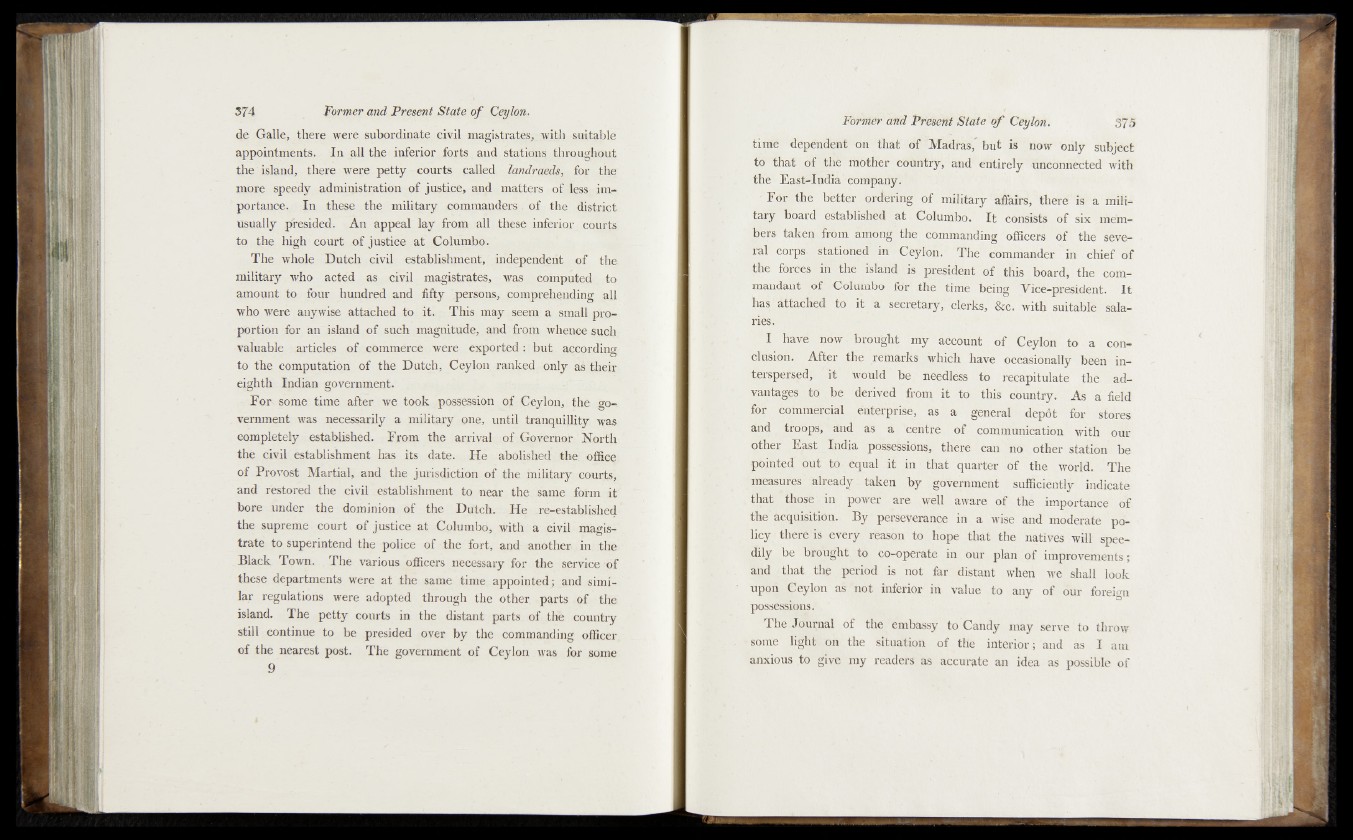
de Galle, there were subordinate civil magisfrafé^;;wi.tb suitable
appointments.- In all the inferior _,fp$ts, and stations jlbroughout
the island, there were petty courts called landraedp, for thq
more spcieidy administration of justice, and Baxters o |^ c ^ ' im-
portance. In these the military commanders., of tbq district
usually jxresided. An appeal lay from all these inferior^ courts,
to the high court of justice at Colombo..
The whole Dutch civil establishment, independent of thei
military who acted as civil magistrates, was computed to-
amount to four hundred and fifty persons^qroprehending all
who were any wise attached to it. This may .seem a small, proportion
for an- island of such magnitude, andfrqm whence, such,
valuable articles of commerce were exported :'but. according,
to the. computation of the Dutch, Ceylon;‘.racked .'only a&'.fheir.
eighth Indian government. 7
Fors some time after we tp.ok .possession Ceylon,.- the go-,
vemment was necessarily a mih&i’y ®ne, until tranquilli^-wasi
completely established. From the arrival of-: GayefÓ0i7 Mortfr
the civil establishment has its date. He abolished; the office,
o f Provost Martial, and the jurisdiction of th e military: courts,'
and restored the civillestablfahraent to mear th ^ iam e ;fotm. it
bore under the dominion of the Dutch. He .re-established
the supreme court of justice at Columbo, with a m i l magistrate
to superintend the police of .the fort, apd another in .thé
Black Town. . The various officers necessary for the service óf
these departments were at the same time, appointed; and similar
regulations were adopted through the other, parts of the
island. The petty courts in the distant parts of the country
still continue to be presided over by the commanding officer,
of the nearest post. The government of Ceylon was for some
9
Fortner and Present State o f Ceylon. 375
time dependent on that of Madras/ biit is now only subject
to'-'fhat of thè mother country, and ^ tire ly Unconnected with
the East-India ’ eompariy.
' Fór-fhe better ordering' of military affairs, there is a miK-
taryt>oar(f established H . Columbo^ I t consists of six Members
takeiy from ambn^ the commanding 'officers of the several'
corps. *Moned in^Ceÿfon: The commander in chief of
•thé « ■ g the island' is pçesidept of this boardy the commandant
o f^ Columbo for’ the* time being Vice-president. I t
'li|s' |ttached to i t V secretary,^dlerks,' 8ce. with suitable salariés.'
'
I h aw |u pw - brought my account of Ceylon to . a con-,
elusion. After the. remarks which have occasionâlly héén in-
tb rsp ers^ ; 'i t would be needless to recapitulate the advantages
Hÿ |®ld eriv ed from it to this country. As a! field
to j commercial enterprise; as a general depót for stores
and f troops, and as a ‘centre of communication with oür
B g ^ j | | g | | | India possessions, thérè 1 can no other station he
pointed3 out to equal it in that quarter of the world. The
'measures-^already: talren by government sufficiently indicate
that thosë'rfp power are well aware of the importance of
thé'hpqp^iltïön. By perseyerahee in a wise and moderate pd-
JjSy. therê>% every reason to hope that the natives will speedily
be brought to co-operate in our plan of improvements ;
and that the period is hot far distant when we shall look
upon Ceylon as*not inferior in value to any of our foreign
possessions.
TheJo'urnal-of the embassy to Candy may serve to throw
some light* on the situation of the interior ; and às I am
anxious to give my readers as accurate an idea as possible of